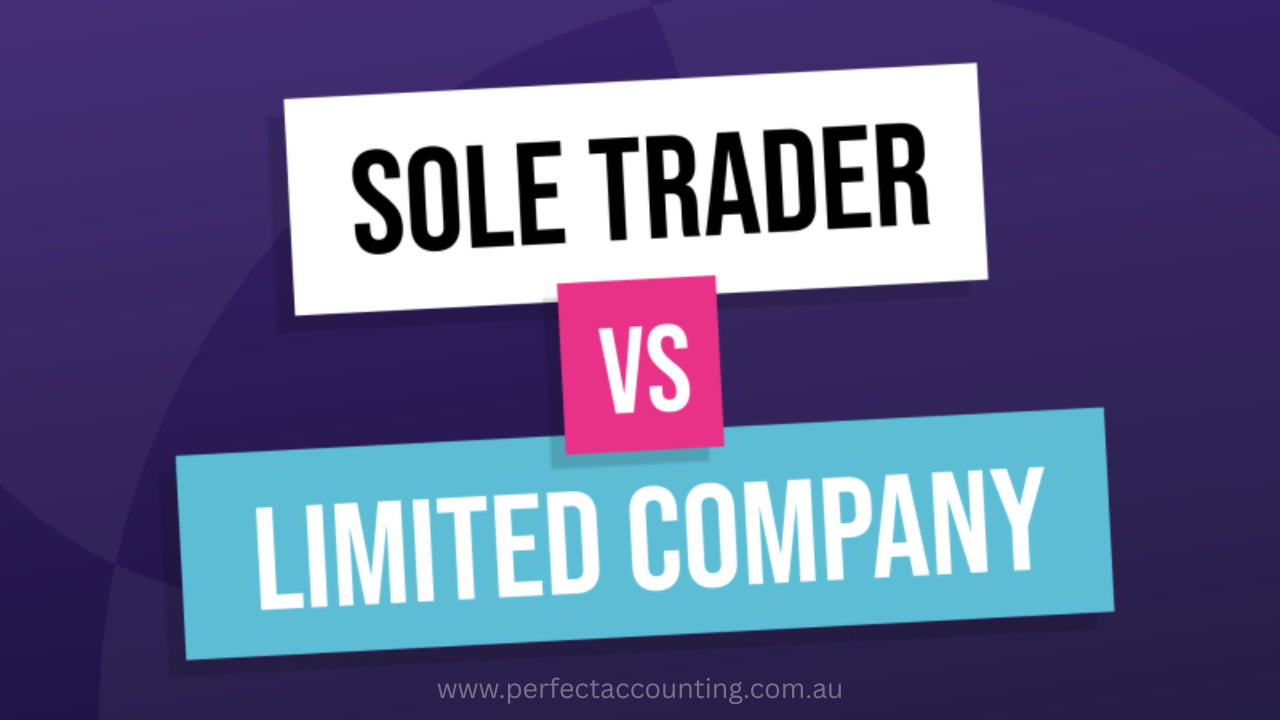Starting a business is one of the most exciting—and sometimes overwhelming—steps you can take. One of the first big decisions you’ll face is choosing the right business structure. In Australia, the two most common options are Pty Ltd (Proprietary Limited Company) and Sole Trader. But which one is right for you?
In this guide, we’ll break down the differences between a Pty Ltd vs Sole Trader setup in plain English, using relatable examples, and a step-by-step guide to help you decide. Plus, we’ll show you how Perfect Accounting can help you navigate the entire process with ease.
What is a Sole Trader?
A Sole Trader is the simplest and most common type of business structure in Australia. It means you run the business by yourself, and you are legally responsible for all aspects of it.
✅ Pros of Being a Sole Trader:
- Simple setup: Easy to register and start operating
- Low cost: Minimal fees and fewer legal obligations
- Full control: You make all the decisions
- Tax benefits: You may be able to claim personal tax deductions
❌ Cons:
- Unlimited liability: You’re personally liable for debts and legal issues
- Harder to raise capital: Investors prefer companies
- Less credibility: Might look less professional to clients or partners
Example: Jane runs a local bakery and wants to keep things small. She chooses to be a sole trader because it’s easy to manage and inexpensive. However, when she wants to expand and needs a business loan, she finds it hard without a formal company structure.
What is a Pty Ltd Company?
A Pty Ltd (Proprietary Limited) company is a private company that is registered with ASIC (Australian Securities and Investments Commission). It’s a separate legal entity from the owner.
✅ Pros of a Pty Ltd:
- Limited liability: Your personal assets are protected
- More credibility: Looks more professional and trustworthy
- Easier to scale: Attracts investors and partners
- Tax flexibility: Corporate tax rates may be lower than personal income tax
❌ Cons:
- More paperwork: Legal requirements and compliance
- Higher costs: Setup and ongoing fees are higher
- Less control: You may need to share decision-making with directors or shareholders
Example: Tom launches a tech startup. He registers as a Pty Ltd so he can attract investors and protect his personal assets. While there’s more paperwork, he gets funding more easily and looks more credible to clients.
Pty Ltd vs Sole Trader: Key Differences
| Feature | Sole Trader | Pty Ltd Company |
|---|---|---|
| Legal Entity | Not separate from owner | Separate legal entity |
| Liability | Unlimited | Limited to company assets |
| Taxation | Personal income tax | Company tax rates |
| Setup Cost | Low | Higher |
| Ongoing Costs | Minimal | Annual ASIC fees, accounting costs |
| Compliance Requirements | Simple | Must lodge company returns, maintain records |
| Control | Full control | Shared if multiple directors/shareholders |
| Funding Access | Limited | Easier to secure investment |
Step-by-Step Guide to Choosing the Right Structure
1. Understand Your Goals
Are you looking for fast setup and full control (Sole Trader)? Or do you plan to grow, hire staff, or seek investors (Pty Ltd)?
2. Evaluate Risk
Do you operate in a high-risk industry? If so, limited liability protection from a Pty Ltd could be safer.
3. Consider Your Finances
What is your budget for setup and compliance? A sole trader is cheaper to start but may cost more in tax later on.
4. Think About Taxes
Discuss with a professional which option will minimize your tax burden. A Pty Ltd might offer better tax planning strategies.
5. Seek Expert Advice
This is where Perfect Accounting comes in. Their experienced agents will guide you every step of the way and handle all the complicated parts.
Which One Should You Choose?
There’s no one-size-fits-all answer. If you’re just starting out, testing a business idea, or working freelance, a Sole Trader setup could be the way to go. But if you’re serious about scaling, protecting your assets, and appearing more professional, a Pty Ltd structure is likely better.
Why Work with Perfect Accounting?
Starting or changing your business structure involves a lot of paperwork, tax planning, and legal knowledge. That’s where Perfect Accounting comes in:
- Business Structure Advice
- Company Setup & ABN Registration
- BAS & Tax Return Services
- Compliance with ASIC & ATO
- Ongoing Bookkeeping & Payroll Support
Their friendly, expert team makes complex processes simple—so you can focus on growing your business confidently.
Bonus Tip: Perfect Accounting offers free consultations to help you figure out the best structure for your needs. Book yours today!
Final Thoughts
Choosing between a Pty Ltd vs Sole Trader setup is a big decision. But with the right guidance and understanding, you can make a choice that sets your business up for success.
Don’t go it alone. Partner with Perfect Accounting—and build your business on a solid foundation.
Need help deciding? Reach out to Perfect Accounting today and get expert advice tailored just for you!







